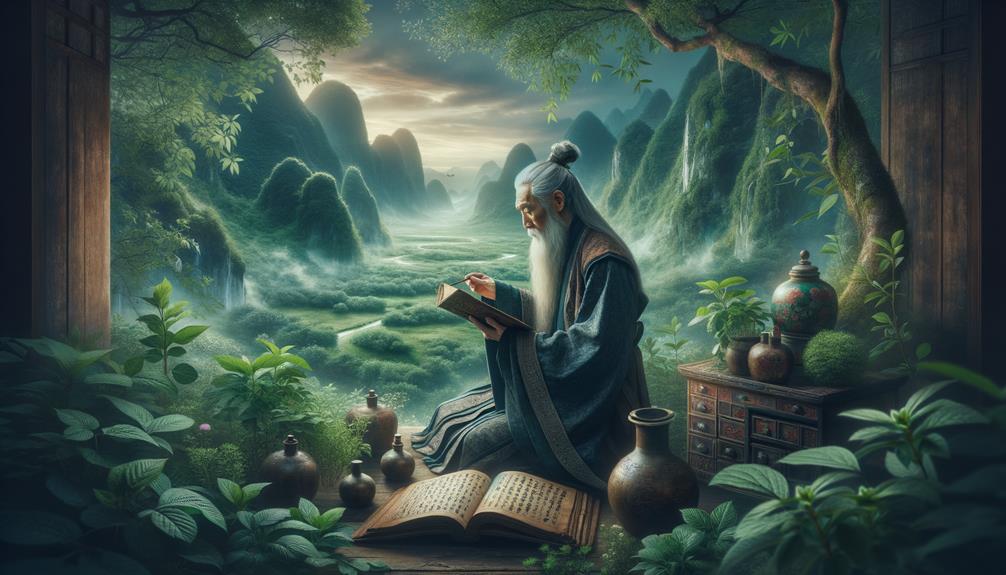Shennong, the legendary progenitor of ancient Chinese medicine, captivates our imagination. Born over 4,500 years ago, he radiated extraordinary wisdom from a tender age. His fabled quest saw him mastering agriculture, inventing the plow, and systematically testing 365 medicinal plants on himself. Shennong embodied the archetypal healer, navigating the realms of mortals and the divine, profoundly shaping the course of medicine and farming. His teachings inspired enduring traditions celebrated in festivals and folklore throughout China. Delve into his extraordinary story, and unearth the profound roots of his timeless legacy.
Early Life and Legends
Born in the 28th century BCE, Shennong defied ordinary expectations from the start. Stories depict him speaking mere days after birth and walking within a week, displaying remarkable abilities for a newborn. By three years old, he could till fields like an adult, showcasing superhuman strength.
The God-King earned his moniker "Father of Chinese Medicine" through relentless study of nature's remedies. Shennong meticulously identified and logged 365 medicinal plant species, laying the groundwork for traditional Chinese herbal treatments still practiced today. His quest went beyond academic curiosity – it transformed lives through healing.
Shennong's mythic journey abounded with heroic deeds driven by divine purpose. Each tale cemented the foundations of a medical tradition woven into Chinese culture's fabric over millennia. While portrayed with bovine features, his impact on healthcare remained quintessentially human.
Contributions to Agriculture
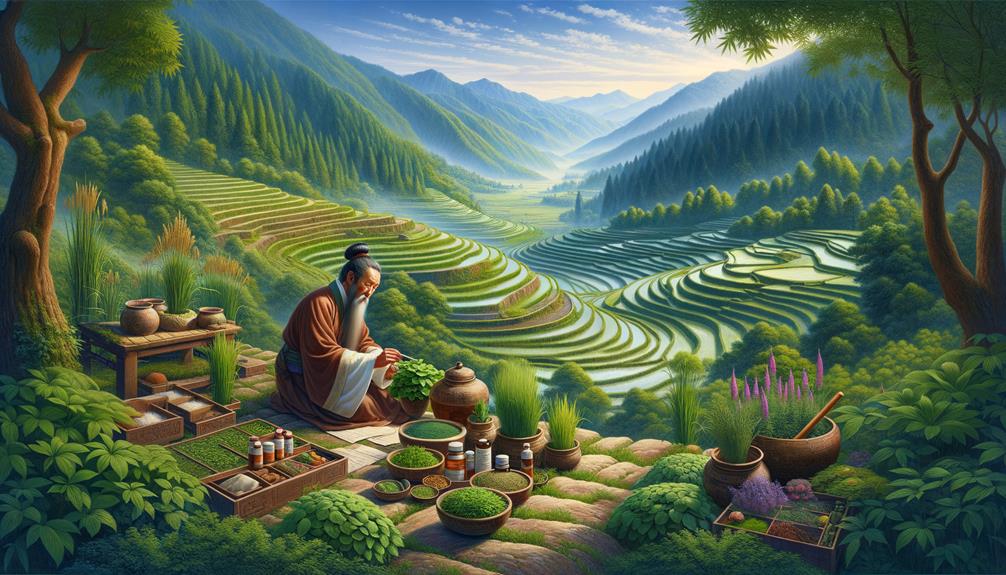
Shennong's groundbreaking agricultural innovations laid the foundations for ancient China's prosperity. His ingenious inventions, like the plow and cart, streamlined farming practices, boosting productivity. Clearing land through controlled burning expanded arable areas for growing populations.
Domesticating oxen and horses as farming partners amplified our cultivation capabilities. Shennong championed balanced diets centered on grains and vegetables, enhancing community well-being. His visionary teachings enabled:
- Increased farming efficiency through the plow and cart.
- Expanded cultivable land via controlled burning.
- Harnessing the strength of domesticated oxen and horses.
- Dietary balance by cultivating grains and vegetables.
Shennong's agricultural wisdom catalyzed economic growth by establishing a stable food production system, allowing ancient Chinese communities to thrive sustainably.
Herbal Medicine Discoveries
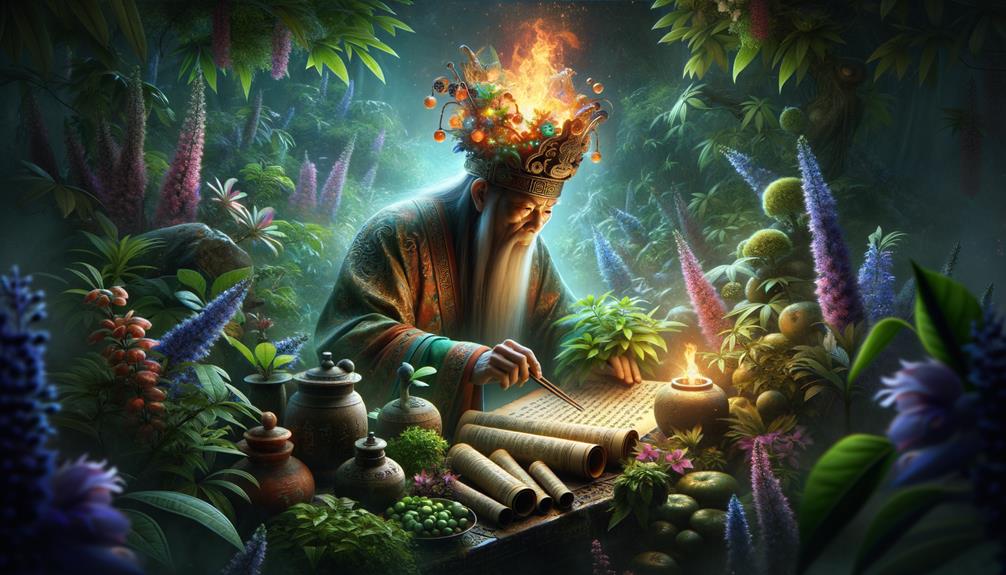
Fueled by an insatiable thirst for knowledge, Shennong immersed himself in the wilderness, meticulously documenting 365 medicinal plants that formed the bedrock of traditional Chinese medicine. In his tireless pursuit, Shennong became a living legend, personifying the archetypal explorer willing to make sacrifices for the greater good. Renowned as the Father of Chinese Medicine, he tasted every herb himself, braving pain and peril to uncover their secrets.
Through his courageous self-experimentation, Shennong unveiled invaluable herbal remedies that transformed healthcare practices. He identified the therapeutic properties of tea, revitalizing and purifying the body. This finding was merely one of many that highlighted nature's profound wisdom.
Shennong's dedication to herbal medicine transcended mere cataloging; it established a foundational pharmacopeia guiding generations. His work emphasized natural remedies' significance in healing, solidifying medicinal herbs' role in Chinese medicine.
With each plant documented, Shennong's journey illuminated the path for future healers, ensuring his contributions would resonate through the ages. His discoveries in herbal medicine remain a testament to nature's enduring power and human ingenuity's potential.
Mythological Significance
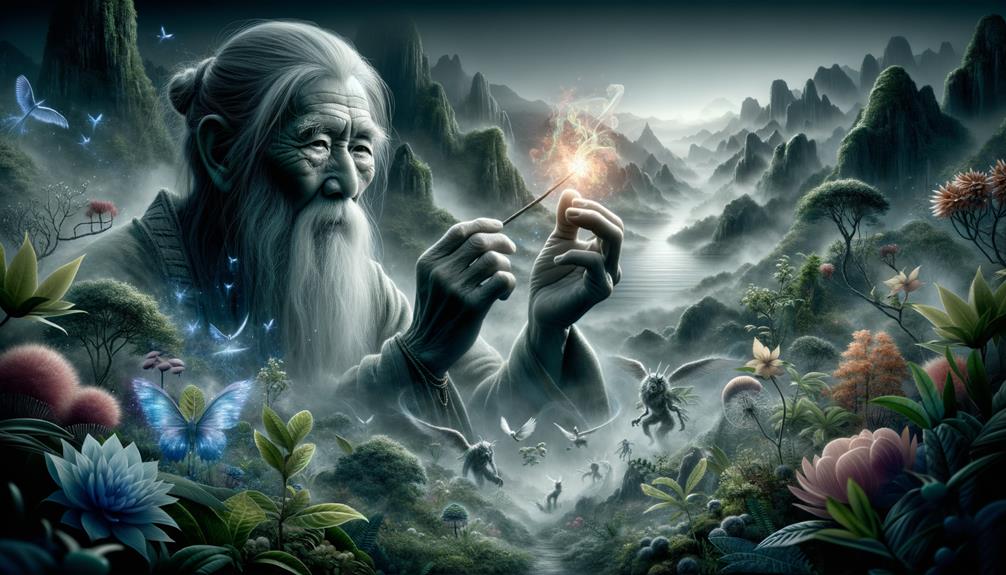
When considering Shennong's mythological impact, his journey transcends mere herbal discoveries and agricultural wisdom. Born from divine roots, his teachings transformed human life, with their cultural echoes reverberating through Chinese folklore. Shennong personifies humanity's eternal pursuit of knowledge.
Divine Origins Explored
In the rich tapestry of Chinese myths, Shennong's birth intertwines celestial and earthly realms – his father, a mighty dragon, embodying divine wisdom; his mother, a noble princess. This blending of supernatural and human lineage shapes his pivotal role as a healer and herbal pioneer.
Shennong's divine parentage and kinship with the legendary Yellow Emperor position him as a mythical hero bridging heaven and earth. His origins highlight key elements:
- Dragon Father: Representing divine power and knowledge.
- Royal Mother: Granting nobility and leadership.
- Kinship with Huangdi: Elevating his status among Chinese deities.
- Destiny as Healer: His birth paves the way for pioneering ancient medicine.
Shennong's celestial roots aren't just about his birth; they define his journey guiding humanity through the marvels of traditional Chinese herbalism, embodying the union of sacred and mortal realms.
Symbolic Contributions Analyzed
Shennong's mythology intertwines fiction and fact, depicting the archetypal healer bridging the divine and human realms. As Chinese medicine's founding figure, his heroic journey unveils a quest to understand nature's medicinal potential. Fearlessly sampling 365 botanical species revealed his devotion to human wellness.
In mythic symbolism, Shennong personifies the wisdom-seeker guided by divine insight and benevolent purpose. Shifting ancient diets to plant-based sustenance marked a transformative era, blending spirituality with earthly existence. As the agricultural deity, his impact extended beyond healing practices.
Shennong's symbolic role transcends the earthly plane, elevating him to god-like status in Chinese lore. His herbal knowledge remains integral to traditional medicine, reminding us of the harmonious relationship between nature's bounty and healing arts.
Cultural Impact Assessed
The Shennong legend encapsulates a profound cultural narrative, one where the archetypal hero intersects with society's quest for healing and agricultural prosperity. Venerated as a divine ruler, Shennong exemplifies the sagacious leader guiding humanity through discovery and benevolence. His unrelenting experimentation with herbs laid the groundwork for traditional Chinese medicine, showcasing an unwavering commitment to the well-being of his subjects.
Shennong's mythical significance crystallizes into several core elements:
- Cultural Icon: Celebrated for teaching crop cultivation, transitioning society from foraging to farming.
- Medical Trailblazer: His botanical compendium encompassing 365 medicines became the bedrock of traditional Chinese herbal practices, reverberating through centuries.
- Divine Figure: Recognized as divine, Shennong's legacy as the progenitor of Chinese medicine underscores his sagely wisdom and guidance.
- Resilience Personified: His personal trials ingesting various herbs symbolize the indomitable human spirit in the pursuit of knowledge and health.
These aspects illustrate how Shennong's influence extends beyond historical achievements, forever etching him into the cultural and spiritual fabric of Chinese civilization.
Influence on Chinese Culture
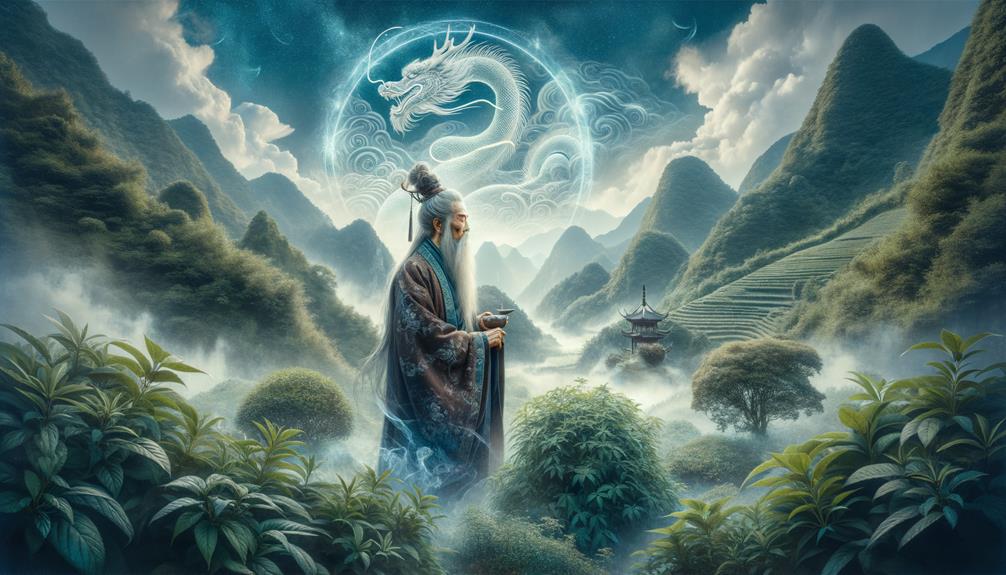
Shennong, a legendary figure from ancient Chinese history, left an indelible mark on agriculture and herbal medicine. His renowned catalog of 365 medicinal plants showcased his dedication to nurturing and healing the people. Through his teachings, Shennong embodied the archetype of a wise sage, forever shaping Chinese cultural traditions.
Herbal Medicine Legacy
In China's storied past, herbal medicine traces its origins to Shennong, a legendary figure intimately connected with the earth. Shennong embarked on a lifelong quest to comprehend the medicinal properties of plants. His catalog of 365 botanical medicines became traditional Chinese medicine's bedrock, showcasing herbs integral to the Chinese pharmacopoeia.
Shennong's teachings on these herbs did more than shape an era; they forged an enduring cultural legacy. His profound influence permeates Chinese consciousness, where nature and health are intrinsically intertwined. Shennong's impact endures through:
- Herbal Remedies: His catalog guides healers and practitioners in the art of traditional Chinese medicine.
- Cultural Reverence: Shennong is celebrated as a cultural hero, symbolizing humanity's harmony with nature.
- Educational Influence: His insights inspire the study and practice of herbal medicine, nurturing future generations of healers.
- Pharmacopoeia Development: His work laid the foundation for the extensive Chinese pharmacopoeia, an invaluable resource.
Shennong's journey through the ages stands as a testament to nature's timeless wisdom.
Agricultural Practices Impact
From the ancient Chinese farmer Shennong's intimate knowledge of the earth's bounty, agriculture in the region underwent a profound shift. Shennong, revered as the divine cultivator, reshaped farming practices by introducing revolutionary tools like the plow and cutting-edge techniques for working the land. These weren't mere incremental changes; they planted the seeds for a sustainable agricultural future.
Shennong's advocacy of crop rotation and irrigation methods were game-changers. Rotating crops ensured soil fertility by preventing nutrient depletion. Innovative irrigation maximized water usage, enabling bountiful harvests even during dry spells. This forward-thinking approach stabilized food production, nourishing generations to come.
Yet Shennong's impact extended further. His deep understanding of soil management and seasonality led to the development of detailed agricultural calendars – sacred guides informing farmers when to plant and reap, intertwining agriculture with cultural rituals. Shennong fostered an intimate bond between the Chinese people and their lands, shaping dietary customs and culinary traditions that persist today. Through this wisdom, Shennong's spirit continues cultivating the heart of Chinese culture.
Legacy and Modern Impact
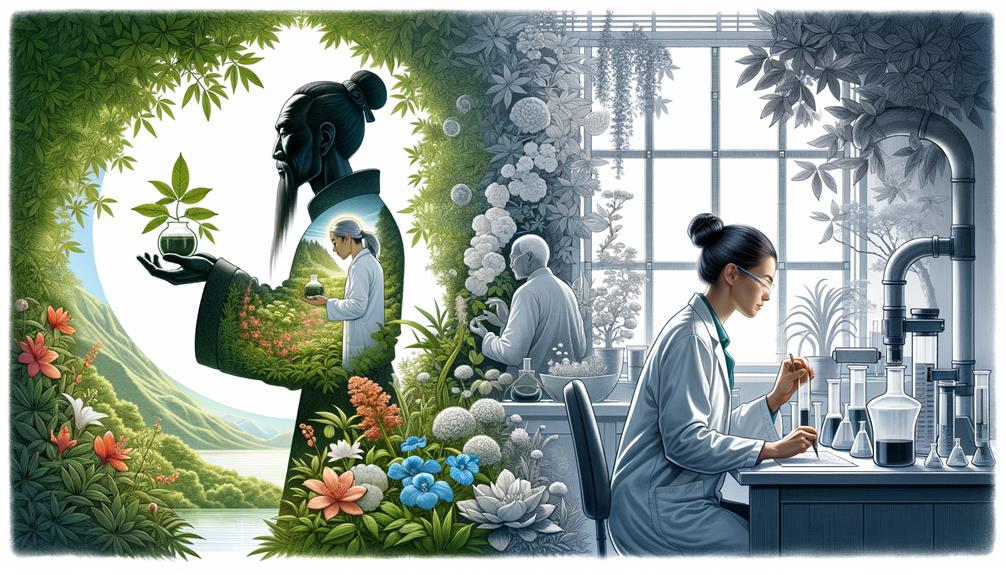
Shennong's ancient wisdom lives on in modern herbal medicine, a testament to timeless truths. As the revered Father of Chinese Medicine, his catalog of 365 medicinal plants guides contemporary herbalists. His insight into nature's remedies has seamlessly integrated into holistic healing worldwide.
Shennong's influence persists, bridging past and present:
- Herbal Medicine: Practitioners rely on his foundational reference for traditional Chinese medicine.
- Agricultural Practices: His farming teachings promote sustainable cultivation in harmony with healing.
- Cultural Significance: Chinese folklore, temples, and festivals immortalize Shennong, honoring nature's wisdom.
- Holistic Health: His principles advocate natural remedies and balance for well-being.
From mythic Emperor to cultural hero, Shennong's quest for knowledge inspires. His enduring legacy continues healing, proving wisdom's timeless power.
Frequently Asked Questions
Who Was the Father of Chinese Medicine?
Shennong, an ancient Chinese legend, paved the way for traditional medicine through meticulous experimentation with plants and herbs. His methodical approach transformed archaic practices into a coherent system that prioritized holistic wellness. Shennong's fearless spirit and tireless pursuit of knowledge left an indelible mark, guiding generations towards natural remedies rooted in balance and harmony.
What Was Shennong Known For?
Shennong, a legendary figure, became renowned for domesticating animals, pioneering agricultural tools like the cart and plow, and identifying medicinal plants. His groundbreaking contributions to farming and healing practices paved the way for innumerable generations that followed.
What Is the Story of Shennong and Tea?
Let me tell you about the time I stumbled upon tea by pure chance. While boiling water over a fire, a stray leaf drifted into my pot, creating an unexpected yet delightful beverage. This accidental discovery sparked a transformative journey as I sought to harness nature's gifts for well-being.
Who Is the King of Medicine in China?
Picture a courageous soul sampling countless herbs to cure ailments. Shennong, China's legendary herbalist, risked his life in pursuit of healing knowledge, establishing practices still vital in traditional Chinese medicine.
Shennong's dedication laid the foundations for an ancient medical system. His teachings, passed down through generations, have profoundly influenced modern understanding of herbal remedies and natural cures. Many stories recount his willingness to ingest toxic plants firsthand to comprehend their effects, exemplifying an unwavering commitment to uncovering therapeutic properties.
While some tales may be mythical, Shennong's impact remains undeniable. His pioneering spirit continues inspiring practitioners to explore nature's pharmacy, blending wisdom from the past with contemporary insights. The reverence for this iconic figure underscores traditional Chinese medicine's deep roots and enduring relevance in holistic healing.

